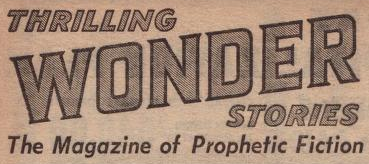Short Reviews – Yesterday’s Doors, by Arthur J. Burks
Friday , 31, March 2017 Uncategorized 2 CommentsYesterday’s Doors by Arthur J. Burks appeared in the October 1948 issue of Thrilling Wonder Stories.
After reading Yesterday’s Doors, I think I finally begin to ‘get’ Thrilling Wonder Stories’ angle on science fiction. It’s Sense of Wonder, but not in the way that it’s typically meant when referring to Sci-Fi. In the case of Thrilling, the stories seem to revolve around one weird and fantastical concept to make you think. That’s not to say “everything is realistic except for one thing”; it’s “What if a Moon gave you the powers of a god?”, “What if a guy who wanted a girl got turned into a giant?”, “What if a pair of circus freaks turned out to be shipwrecked aliens?”, “What if a man could explore all of his past lives?” or “What if atoms were sentient and had intelligence?”
Yesterday’s Doors is very much what I’d call a ‘thinky’ story; it’s much more cerebral than it is action driven, but it plays on a wide variety of ideas and presents them in a way reminiscent of a lucid dream. It’s a story about ideas that are explored in strange ways in bizarre settings rather than about characters doing exciting things in bizarre settings. In this regard, it’s something like a Gibson story; you’re on a train to nowhere where gentle music plays in the background, but damn if the countryside out the window isn’t beautiful.
The story starts with amnesiac “Dean Hale”, who lives in a city where, much like in Big O, people walk around dreamlike, often amnesiac like himself. Sometimes people wake up, sometimes they don’t, and are content to aimlessly drift through the rest of their lives not knowing who or why they are. “Dean Hale” does not even know if he is “Dean Hale”, but he has been accused of and interrogated for the murder of a Marion Slade.
Citing a lack of evidence against him, the police eventually relent and release “Dean” into the custody of one of the plainclothes cops who brought him in. This cop offers to take “Dean” somewhere that he can get his memories back. Since all human testing has been banned, “Dean” figures that the whole thing was a setup to turn him over to a bunch of scientists as black market guinea pig – an idea that’s hammered home by the fact that Marion Slade, the woman he was accused of murdering, is a staff nurse at the facility he’s brought to. But, if there’s a chance “Dean” can get his memories back, he figures what the hell?
“Dean” is brought before a mysterious cabal of 12 doctors, nameless save for the letters they ask for him to refer to them by. Dr A welcomes Dean and asks that he let them strap him into something resembling an electric chair with the other 11 doctors, all of whom seem strangely familiar to the amnesiac.
In the chair, “Dean” has a living memory of a life as a Father Wulfram, a brilliant inventor at Saint Denis in 792. Wulfram has invented the idea for an airplane and built a small prototype. One of the elders, who bears a resemblance to Dr. A, insists it’s deviltry, but “Wulfram” convinces the other senior monks to allow it to be buried beneath the monastery rather than be destroyed. When he returns to the present, “Dean” is informed that the prototype has been unearthed from beneath the ruins of the monastery.
“Dean” is sent back again, further, to before the destruction of Atlantis, where in a past life he was a scientist who could either avert the disaster that would destroy civilization or ensure it, escaping to become a god among men. In the end, he chooses the latter, but deeply regrets it, wishing he could go back and right the wrong. It turns out that the 12 scientists are various elders he has known in many, if not all of his past lives, stretching back to the dawn of man. He can make up for his treachery at Atlantis by exploring his past lives to ensure that genius and invention are not lost to time. Realizing the potential for the technology, despite taking years, lifetimes even, to explore a person’s past lives to retrieve lost knowledge, “Dean” agrees, volunteering to strap back in and devote the rest of his days as a psychonaut retrieving forgotten inventions.
One of the things that really struck me while reading this was how much I could see it being made into one of those auteur experimental films. Lots of unnatural lighting, Dutch angles, low budget feel with a high-budget price tag with maybe some Pink Floyd or Simon & Garfunkel in the soundtrack… Fill Atlantis with a bunch of naked hippies, film on some rock off of Italy or Turkey, add some prism flares for special effects, and give it an open ending that makes you question why you watched it and who let someone film this. It would absolutely have had some sort of cult following who’d argue that it was one of the deepest SF films ever made.
As a piece of prose fiction, it was not action-packed, it was not particularly exciting, nor did it have any romance. Yet it was still interesting and engaging enough to watch unfold. Sometimes an idea and exceptional scenery IS enough to make story feel worthwhile. If nothing else, they can be idea mines, where the concepts and settings explored can be worked into forms that better suit your tastes. Heck, we have in this story a barebones foundation for a Quantum Leap-style adventure series!
It would be very helpful if these short reviews included a link to where the story could be found (Gutenberg?) for those of us who’d like to add yet another thing to our TBR piles.